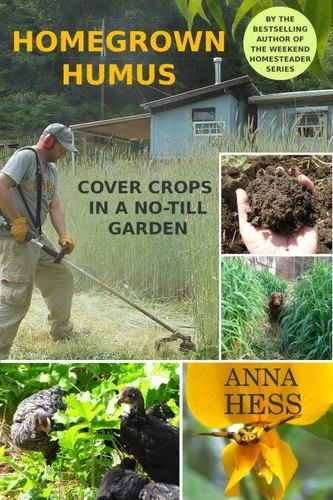Homegrown Humus: Cover Crops in a No - Till Garden. Permaculture Gardener, #1
Par :Formats :
Disponible dans votre compte client Decitre ou Furet du Nord dès validation de votre commande. Le format ePub est :
- Compatible avec une lecture sur My Vivlio (smartphone, tablette, ordinateur)
- Compatible avec une lecture sur liseuses Vivlio
- Pour les liseuses autres que Vivlio, vous devez utiliser le logiciel Adobe Digital Edition. Non compatible avec la lecture sur les liseuses Kindle, Remarkable et Sony
 , qui est-ce ?
, qui est-ce ?Notre partenaire de plateforme de lecture numérique où vous retrouverez l'ensemble de vos ebooks gratuitement
Pour en savoir plus sur nos ebooks, consultez notre aide en ligne ici
- FormatePub
- ISBN978-1-5199-2576-3
- EAN9781519925763
- Date de parution07/12/2013
- Protection num.pas de protection
- Infos supplémentairesepub
- ÉditeurMordant Media
Résumé
Homegrown humus is easy with cover crops! Cover crops are a simple, cheap way to boost your soil's organic matter, to fight weeds, to prevent erosion, to attract pollinators, and to keep the ecosystem in balance. Unfortunately, most information on growing cover crops is written for people who plow their soil every year and are willing to spray herbicides. You can get all of the same benefits in a no-till garden, though, if you're clever. Homegrown Humus details five no-till winners in depth --- buckwheat, sweet potatoes, oilseed radishes, rye, and oats.
Profiles of other species suggest gardening conditions when you might want to try out sunflowers, annual ryegrass, barley, Austrian winter peas, crimson clover, cowpeas, or sunn hemp as well. Next, you'll learn pro tips on finding cover-crop seeds, planting cover crops in a no-till garden, and easily killing cover crops without tilling or herbicide use. Understanding the C:N ratio of cover crops helps determine how long to wait between killing cover crops and planting vegetables, as well as how to maximize the amount of humus you're adding to your soil. Cover crops are an advanced gardening technique bound to increase your vegetable yields, but with this book they become simple enough for beginners.
Give your garden a treat --- grow some buckwheat! The second edition of Homegrown Humus is fully updated, with three new chapters and a total of 54 photos.
Profiles of other species suggest gardening conditions when you might want to try out sunflowers, annual ryegrass, barley, Austrian winter peas, crimson clover, cowpeas, or sunn hemp as well. Next, you'll learn pro tips on finding cover-crop seeds, planting cover crops in a no-till garden, and easily killing cover crops without tilling or herbicide use. Understanding the C:N ratio of cover crops helps determine how long to wait between killing cover crops and planting vegetables, as well as how to maximize the amount of humus you're adding to your soil. Cover crops are an advanced gardening technique bound to increase your vegetable yields, but with this book they become simple enough for beginners.
Give your garden a treat --- grow some buckwheat! The second edition of Homegrown Humus is fully updated, with three new chapters and a total of 54 photos.
Homegrown humus is easy with cover crops! Cover crops are a simple, cheap way to boost your soil's organic matter, to fight weeds, to prevent erosion, to attract pollinators, and to keep the ecosystem in balance. Unfortunately, most information on growing cover crops is written for people who plow their soil every year and are willing to spray herbicides. You can get all of the same benefits in a no-till garden, though, if you're clever. Homegrown Humus details five no-till winners in depth --- buckwheat, sweet potatoes, oilseed radishes, rye, and oats.
Profiles of other species suggest gardening conditions when you might want to try out sunflowers, annual ryegrass, barley, Austrian winter peas, crimson clover, cowpeas, or sunn hemp as well. Next, you'll learn pro tips on finding cover-crop seeds, planting cover crops in a no-till garden, and easily killing cover crops without tilling or herbicide use. Understanding the C:N ratio of cover crops helps determine how long to wait between killing cover crops and planting vegetables, as well as how to maximize the amount of humus you're adding to your soil. Cover crops are an advanced gardening technique bound to increase your vegetable yields, but with this book they become simple enough for beginners.
Give your garden a treat --- grow some buckwheat! The second edition of Homegrown Humus is fully updated, with three new chapters and a total of 54 photos.
Profiles of other species suggest gardening conditions when you might want to try out sunflowers, annual ryegrass, barley, Austrian winter peas, crimson clover, cowpeas, or sunn hemp as well. Next, you'll learn pro tips on finding cover-crop seeds, planting cover crops in a no-till garden, and easily killing cover crops without tilling or herbicide use. Understanding the C:N ratio of cover crops helps determine how long to wait between killing cover crops and planting vegetables, as well as how to maximize the amount of humus you're adding to your soil. Cover crops are an advanced gardening technique bound to increase your vegetable yields, but with this book they become simple enough for beginners.
Give your garden a treat --- grow some buckwheat! The second edition of Homegrown Humus is fully updated, with three new chapters and a total of 54 photos.






















